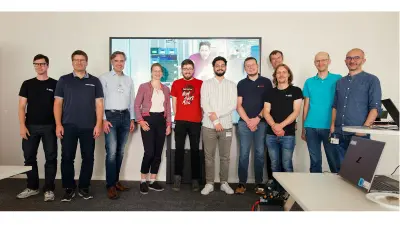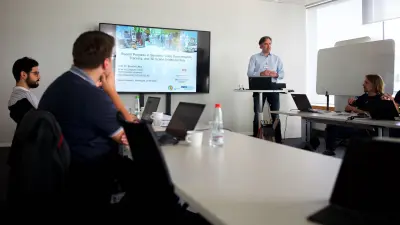3D scene understanding for mobile robots in intralogistics
Bosch Research and the Rheinisch-Westfälische Technische Hochschule (RWTH) Aachen are collaborating to develop intelligent solutions for the 3D environment recognition of autonomous mobile robots — an exciting challenge given the scarcity of data in industrial application scenarios.

As humans, we can intuitively grasp the structure of space, landmarks, prominent objects, and their functions when we enter a new environment. We can also easily understand the interactions of people with each other and with objects in the environment.
However, this poses a very complex problem for developers of autonomous robots: most modern robots are able to recognize objects as obstacles. Equipping mobile robots in industrial scenarios with deep AI-based 3D scene understanding is a real challenge, given the large number of different objects and structures in a factory or warehouse.
The cooperation between Bosch Research and RWTH Aachen University addresses precisely this problem, with a particular focus on the scarcity of data in industrial application scenarios. To this end, the cooperation covers a broad spectrum from the fundamentals of 3D scene understanding to issues of human-robot interaction and specific applications for autonomous systems in an industrial environment. Bosch Research is supporting the implementation and funding of a number of research topics as part of a multi-year collaboration that began in 2022 and will continue until the end of 2025. It is also planned to support up to five doctoral students at the Computer Vision Chair of Prof. Dr. Bastian Leibe. On the Bosch side, the collaboration will be led by Dr. Timm Linder, Research Scientist at Bosch Research.
Data-efficient processes
In order for autonomous robots to act efficiently, a comprehensive understanding of their environment is required. Modern artificial intelligence (AI) methods used for this purpose and co-developed by RWTH Aachen University are usually trained on very large data sets annotated by humans. Research in the field of automated driving, for example, benefits from such publicly available data sets. However, there is a lack of comparable data in the field of mobile industrial robotics. Data-efficient methods, e.g. based on self-supervised learning or large pre-trained models (foundation models), could therefore be of great help in developing robust algorithms that not only work in the laboratory, but also prove themselves in complex real-world application scenarios.
The cooperation between Bosch and RWTH Aachen University will not only lead to scientific publications at internationally recognized conferences but will also give young scientists the opportunity to work on highly relevant practical issues and to present the results of their research live on robots at Bosch Research.

The overall goal of the collaboration is to advance the development of intelligent autonomous systems that can interact and collaborate with humans more intuitively and efficiently. Bosch hopes that the research will lead to innovative solutions that can potentially be transferred to other applications. Artificial intelligence-based capabilities, such as 3D scene understanding, are becoming increasingly relevant for various Bosch divisions.